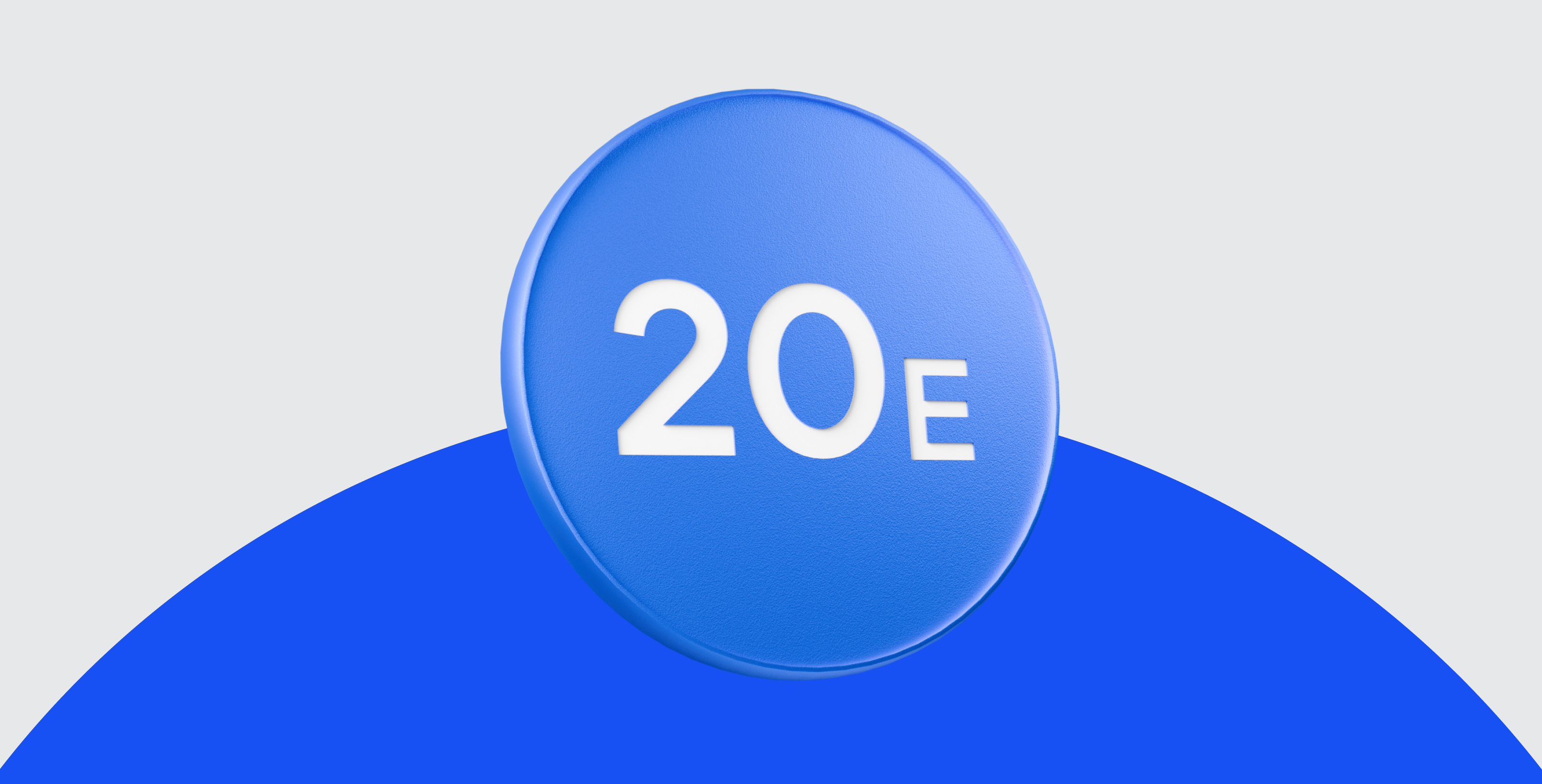A Beginner's Guide To Internet Computer

Imagine a cryptocurrency that could disrupt the internet. The Internet Computer (ICP) is a groundbreaking decentralised 'World Computer' blockchain designed to revolutionise online services. ICP aims to be the blockchain network that brings web speeds to blockchain computation and data storage.
What Is Internet Computer (ICP)?
The Internet Computer Protocol is a fully decentralised ‘World Computer’ blockchain designed to overcome the shortcomings of the traditional Internet. The blockchain enables the creation of online services without the need for traditional centralised IT services such as cloud computing services, databases and web servers, enhancing security and reducing censorship risks. The network's native token, ICP, is utilised for governance, rewarding network participants, and paying transaction fees on the network.
World Computer
The idea of a ‘world computer’ is to be able to make a blockchain so scalable and interoperable that is it indistinguishable from the feeling you get when interacting with a web2 service on the internet.
The Internet Computer blockchain enables full decentralisation because it allows developers to build online web3 services using smart contract software called “canisters” that interact with the web and other blockchains without bridges. Canisters are able to scale and run with an efficiency comparable to traditional IT, making it the first web-speed, internet-scalable public blockchain.
When Web3 services have been built using other blockchain ecosystems, the traditional IT used can be replaced by Internet Computer smart contracts which may provide more efficient decentralised data storage and processing.
On the internet, if a user wants to connect to some software, they only need to know a few things like the IP address of the machine that’s running the software and the Transmission Control Protocol (TCP) port that the software is listening to. On the Internet Computer, if a user wishes to call a function, they only need to know the identity of the canister and the function signature. In the same way that the Internet creates seamless connectivity, the Internet Computer creates a seamless universe for software, where any software given permission can call any other software directly without knowing anything about the underlying workings of the network.
How Does Internet Computer (ICP) Work?
The Internet Computer is a blockchain computer protocol, constructed from a hierarchy of building blocks. At the bottom of the pyramid are independent data centres around the world. These data centres host ICP-specific node hardware, which communicates to achieve a consensus on what the state of the Internet Computer should be. A group of nodes is called a ‘subnet’.
Subnet Blockchains
At the core of ICP's architecture are multiple subnets - where each subnet of nodes is its own blockchain. While these subnets function as individual blockchains, they are also fully interoperable and communicate to collectively form a single, scalable network.
Much the same as how traditional infrastructures like public clouds scale out by adding machines, Internet Computer can scale by creating new subnet blockchains from nodes added to the protocol. Each subnet blockchain can process transactions independently, allowing ICP to handle large volumes of transactions without bottlenecks.
Subnet blockchains use a novel consensus system and cryptographic framework called Chain-Key Technology, ensuring secure interactions and maintaining blockchain integrity.
Chain-Key Technology
Each subnet uses chain key cryptography, allowing for efficient validation of messages and maintaining the integrity of the blockchain.
Simply put, each ICP subnet has a fixed public key. The corresponding private key is not stored on a single node, instead, it is split into multiple secret shares and distributed over all nodes using threshold cryptography. This prevents any single node from holding the full key, enhancing security and scalability. Validation of the state and results becomes trivial for users since all they need to do is verify the digital signature against the fixed public key without downloading and validating blocks in the blockchain.
Applications can verify messages by checking the chain key signature. A valid message shows that the message from the blockchain has not been tampered with and that the subnet blockchain is functioning correctly and has not been corrupted.
Chain key signatures have impressive implications and use cases:
- Scalability: No need to keep old blocks in the blockchain available forever – this helps with a scalability bottleneck.
- Interoperability without bridges: Smart contracts can have their own keys and can sign transactions for other blockchains such as Bitcoin and Ethereum. This enables trustless interaction with those blockchains.
Network Nervous System (NNS)
The Network Nervous System (NNS) is an advanced decentralised autonomous organisation (DAO) controlling the Internet Computer network. Running on a master subnet, the NNS allows community members to participate in governance by staking ICP tokens and voting on proposals. NNS automatically executes proposals that have passed voting which ensures that nodes run the same version of the protocol and thus avoids hard forks. Since the chain key of the NNS subnet is constant for all time, nodes can tell that the instructions are genuine by checking the validity chain key signature.
Canister Smart Contracts
A smart contract on ICP is called a canister smart contract, or just a canister. ICP uses WebAssembly as the virtual machine for executing smart contracts. This means developers can write smart contracts in popular programming languages such as JavaScript, TypeScript, Rust, Python, and more.
Furthermore, a single smart contract on ICP is powerful enough to host an entire Ethereum Virtual Machine (EVM). This allows the deployment of EVM smart contracts written in Solidity.
Because canisters can handle HTTP requests, serve web assets, and interact with other Web2 services, it is possible to write a Web3 application with both the backend and front end hosted fully on-chain. Smart contracts can also make requests to other Web2 services outside ICP.
Unlike Ethereum smart contracts which run sequentially within an atomic transaction. ICP embraces scalability and runs smart contracts in parallel. In that regard, smart contracts are similar to processes or microservices from traditional programming. Smart contracts can be fully autonomous and can schedule execution using timers without relying on users sending messages.
Reverse Gas
On other blockchains such as Ethereum, users have to pay what is known as ‘gas’. Gas refers to the fee it costs a network to execute an operation or transaction successfully. In the same way, a car needs gas to get from point A to point B, a blockchain network requires a certain amount of gas to get a transaction or operation from one point to another.
In order to enhance the experience of users browsing Web3 applications, ICP employs what they call the ‘reverse gas model’. This is where it’s the smart contract canisters that pre-pay fees for transactions and not the end users themselves. Canisters buy what are called ‘cycles’ which is simply the unit smart contract pays for consuming resources or doing computations. This is similar to gas in Ethereum but has a fixed price correlating to a group of fiat currencies and is paid for using ICP.
What Makes Internet Computer (ICP) Unique?
Internet Computer (ICP) has several unique traits:
- Zero Fee Blockchain: ICP revere gas model makes it a zero-fee experience for all users, where the burden of payment is on the canister.
- Web-speed Blockchain: ICP is the first blockchain to be able to run at web-level speeds. With finality at 1 second, it is 900x faster than Ethereum and 16x faster than Solana. DApps on ICP can also query at 200 milliseconds.
- Handles HTTP Requests: The ICP smart contract can handle HTTP requests and serve web assets such as HTML, JS, CSS. Smart contracts can also make requests to other Web2 services outside ICP. A web browser can directly interact with a canister smart contract, without involving any public cloud for serving the web interface and assets.
- Trustless Cross Blockchain Interoperability: Through chain-key cryptography, ICP smart contract canisters can have their own keys and can sign transactions for other blockchains such as Bitcoin and Ethereum. This enables trustless interaction with those blockchains.
- Low Fee Storage: Due to ICP architecture, it boasts the cheapest storage costs out of all blockchains, costing around $5 per gigabit (GB) per year.
- Energy Efficient and Green Blockchain: ICP is one of the most minimal energy-consuming blockchains with an energy usage that is 200x less than MasterCard.
What Gives The ICP Token Value?
Internet Computer’s cryptocurrency, ICP, is the native token powering its network. ICP has multiple functionalities that it can derive its value from.
Value can possibly be derived in the following ways:
- Currency Used To Purchase Cycles: The ICP token is the only token that can be used to purchase cycles and fuel smart contracts so that they can perform computations. When ICP is used to purchase cycles, it is burned and disappears from the circulating supply – this creates a deflationary mechanism for the token.
- Earn A Yield: ICP owners can stake their tokens in the Network Nervous System DAO to earn a yield.
- Growing Ecosystem: The internet and cloud storage is one of the largest sectors in the world and ICP could be poised to take market share away from centralised players due to its cost, security and lack of censorship. If ICP can see large user growth the need for the token increases, therefore driving demand and value up.
Where can I buy Internet Computer (ICP)?
At Altify, you can seamlessly buy, sell and trade ICP for fiat currencies or other cryptocurrencies.




